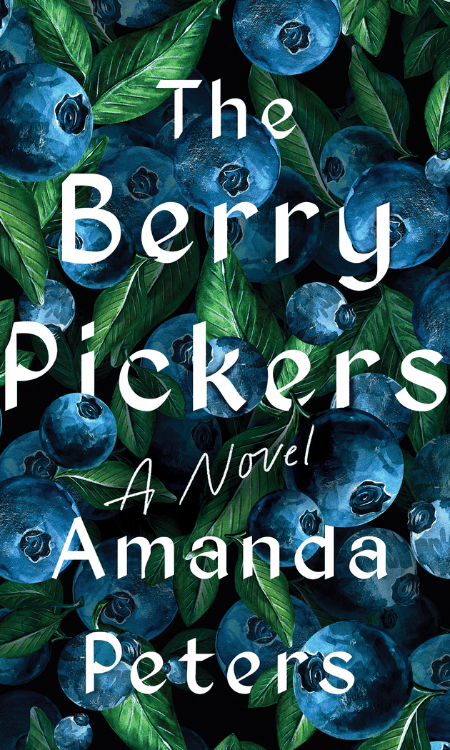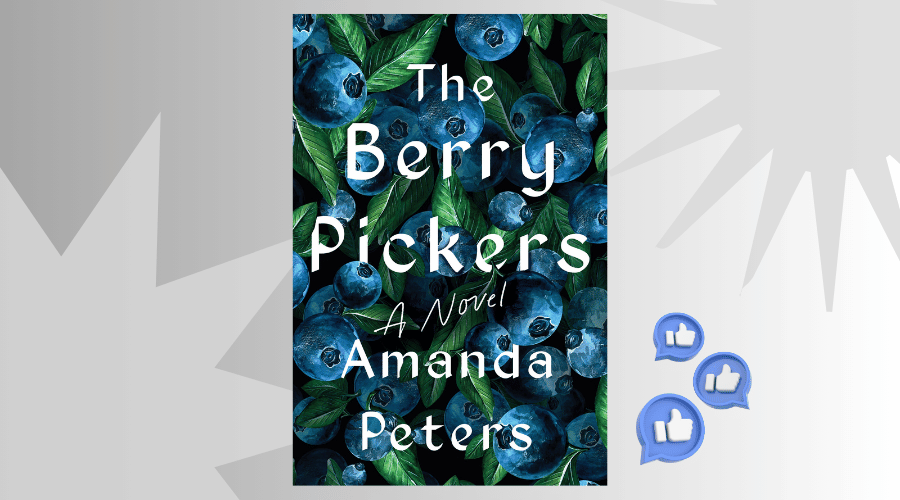The Berry Pickers by Amanda Peters is a moving story about loss, identity, and family. In 1962, Ruthie, a young Mi’kmaq girl, vanishes while her family works as seasonal berry pickers in Maine. Her brother Joe blames himself and carries that guilt throughout his life. Meanwhile, Ruthie has been kidnapped and raised as “Norma” by a white family, unaware of her true origins. As Norma ages, strange memories resurface, leading her to uncover long-buried family secrets. The novel explores the impact of trauma, cultural erasure, and the journey toward forgiveness.

| ✍️Author | Amanda Peters |
| 📅Publication date | April 4, 2023 |
| ⭐Goodreads Rating | 4.13 |
| ✔️ISBN-10 | 141646221958 |
| 📆 Age Rating | 16+ |
| ❔Topics | Fiction, Historical Fiction, Mystery, Indigenous, Literary Fiction, Contemporary, Historical, Adult |
The Berry Pickers Summary
Set primarily in the 1960s, it tells the story of a Mi’kmaq family from Nova Scotia who spend their summers in Maine working as seasonal berry pickers. The family’s youngest daughter, four-year-old Ruthie, mysteriously vanishes one day while sitting at the edge of a blueberry field. Her six-year-old brother, Joe, was the last to see her, and her disappearance leaves the family shattered. For Joe, the loss becomes a lifelong burden, filling him with guilt and regret as he struggles to cope with the devastating event.
The narrative alternates between Joe’s perspective and that of Norma, a girl growing up in Maine who feels out of place in her affluent, overprotective household. Norma experiences recurring dreams and flashes of memory that don’t align with her life. Her darker skin, the absence of early photographs, and the guarded behavior of her parents feed her sense of unease. Over time, Norma begins to suspect that her family is hiding something significant about her past.
As the story unfolds over decades, the novel explores the profound impact of Ruthie’s disappearance on both her biological family and Norma’s life. Joe spirals into guilt-fueled self-destruction, turning to alcohol and isolating himself as he struggles to reconcile with his feelings of failure. His family, haunted by the loss, continues to search for Ruthie, never giving up hope that she might still be alive. Meanwhile, Norma grows increasingly determined to uncover the truth about her origins. Her search leads to a shocking revelation: she is Ruthie, kidnapped as a child by a grieving woman unable to have children of her own.
The reunion between Norma and her biological family is both heartwarming and bittersweet. Joe, now terminally ill, finally sees his long-lost sister and finds some measure of peace before his passing. For Norma, reconnecting with her Mi’kmaq roots offers a sense of belonging and closure, but it also brings complex emotions as she grapples with the life she might have had and the one she lived.
Through themes of cultural erasure, forgiveness, and resilience, The Berry Pickers examines the long-lasting effects of trauma and the ways families survive and heal. The novel offers a thoughtful exploration of identity and belonging, capturing the struggles and strength of Indigenous communities. Amanda Peters’ elegant prose and emotionally rich storytelling make this a novel that resonates deeply, staying with readers long after the final page.
The Berry Pickers Review
The Berry Pickers by Amanda Peters is a beautifully written debut that explores family, identity, and the impact of cultural erasure. It alternates between Joe, a Mi’kmaq boy burdened with guilt after his sister Ruthie vanishes, and Norma, a woman raised by a white family who slowly uncovers her hidden past. The novel has been praised for its emotional depth, seamless storytelling, and thoughtful portrayal of Indigenous experiences. Winning the Barnes & Noble Discover Prize and the Andrew Carnegie Medal, it offers a powerful look at trauma, belonging, and forgiveness.
It’s a book that stays with you long after you close it. It’s a beautifully told story about identity, family, and healing, and it had me hooked from the first page. The alternating perspectives of Joe, a Mi’kmaq boy carrying guilt over his sister Ruthie’s disappearance, and Norma, a woman raised with a stolen identity, made the story deeply emotional and layered.
Pros:
- Authenticity: Peters does an incredible job capturing Indigenous experiences, making the story feel real and respectful.
- Emotional Depth: The characters are flawed but so relatable. Joe’s guilt and Norma’s search for identity were heartbreaking yet inspiring.
- Themes of Healing: The way the novel balances trauma with hope really struck a chord. It’s a reminder of the resilience of the human spirit.
- Writing Style: The prose is simple but powerful, letting the story and characters take center stage.
Cons:
- Pacing: Some parts of the novel felt slower, especially during Norma’s journey of self-discovery. I found myself wanting the plot to move a bit faster.
- Secondary Characters: While the main characters were well-developed, some supporting characters felt less fleshed out. I wanted more from Mae and Lenore, for example.
- Predictability: The ending, while emotional, was somewhat predictable. I could see where the story was headed fairly early on.
Despite these minor drawbacks, The Berry Pickers is a moving and important read. It’s perfect for a book club because it raises so many meaningful questions about identity, family, and cultural heritage. The story stayed with me, and I’m sure it will spark great conversations for anyone who reads it.
The Berry Pickers ending explained
At the end of The Berry Pickers, Norma discovers she is Ruthie, the Mi’kmaq girl who went missing as a child. She reunites with her biological family, including her brother Joe, who is now terminally ill and has carried guilt over her disappearance. The reunion brings emotional closure as they begin to heal from years of separation and loss, highlighting themes of identity, forgiveness, and belonging.
The Berry Pickers Discussion Questions
Here are some thought-provoking book club questions for The Berry Pickers by Amanda Peters, designed to spark discussion:
- Opening Line: The book begins with the line, “The day Ruthie went missing, the blackflies seemed to be especially hungry.” How did this set the tone for the story? Did it influence your expectations?
- Dual Narratives: How did the alternating perspectives of Joe and Norma shape your understanding of the story? Which narrative resonated more with you, and why?
- Family Secrets and Identity: How does the theme of identity unfold through Norma’s experiences? Have you ever discovered a family secret, and how did it change your relationships?
- Forgiveness and Healing: Do you believe all the characters, including Joe and Norma’s adoptive family, are redeemable? What role does forgiveness play in the story?
- Indigenous Identity: How did the book deepen your understanding of Indigenous experiences and the lasting effects of cultural erasure?
- Art and Storytelling: Art is subtly woven throughout the story. What role do you think storytelling and art play in making sense of loss and identity?
These questions encourage reflection on the novel’s central themes—identity, trauma, family, and healing.
The Berry Pickers Character List
Here’s a list of key characters from The Berry Pickers by Amanda Peters:
- Ruthie/Norma – A Mi’kmaq girl who was abducted as a child from the berry fields in Maine and raised as Norma by a white family. Throughout the story, Norma struggles with fragmented memories and an unclear sense of identity until she discovers her true origins.
- Joe – Ruthie’s older brother, who was the last person to see her before she disappeared. Joe carries lifelong guilt for not protecting her and struggles with addiction and inner turmoil as he seeks redemption.
- Mae – Joe’s sister, who helps care for him during his terminal illness. Mae is central in holding the family together amid their grief and struggles.
- Lenore – Norma’s overprotective adoptive mother, who took her after suffering from failed pregnancies. Lenore’s actions, though driven by her trauma, create a complex moral conflict in the story.
- Charlie – One of Joe’s brothers, who later dies in a violent incident near the berry fields, adding to the family’s suffering and sense of loss.
These characters reflect the novel’s themes of family, loss, trauma, and identity, with each bringing unique emotional depth to the story.
Who is Alice in The Berry Pickers
Alice is a secondary but meaningful character in The Berry Pickers. She plays the role of a counselor figure for Norma (who is later revealed to be Ruthie). Alice becomes a supportive presence when Norma’s aunt June arranges their meetings, offering Norma a safe space to express herself and explore her identity. This connection provides Norma with her first sense of autonomy and understanding, which becomes crucial as she navigates the complex emotions surrounding her fragmented memories and family secrets. Alice’s role highlights the importance of empathy and guidance amid personal struggles and discovery.
The Berry Pickers Analysis
The Berry Pickers by Amanda Peters offers a profound exploration of themes such as family, identity, trauma, and reconciliation. Here’s a breakdown of key elements from the novel’s analysis:
Themes and Symbolism
- Identity and Cultural Erasure: The novel explores the lasting impact of stolen identity, as Norma (Ruthie) grows up disconnected from her Mi’kmaq roots after being kidnapped. Her journey toward uncovering her true heritage symbolizes the broader struggles Indigenous communities face with cultural erasure.
- Trauma and Guilt: Joe’s life is marked by guilt and unresolved trauma from his sister’s disappearance and his brother’s later death. His self-destructive behavior reflects how trauma manifests differently within families, often leading to cycles of pain and coping through addiction.
- Family and Forgiveness: The story focuses on healing and reconciliation, as Norma reconnects with her biological family. Forgiveness, particularly within the family, emerges as a central theme, demonstrating the importance of understanding, even in the face of painful truths.
- Hope and Resilience: Despite the heavy subject matter, the novel threads hope throughout its narrative. Norma and Joe’s reunion, though bittersweet, represents the possibility of healing after years of separation, loss, and personal struggle.
Character Dynamics
- Norma/Ruthie: Her character symbolizes dislocation and the search for belonging, as she navigates life with fractured memories and an unclear identity.
- Joe: Through Joe, the novel portrays the emotional weight of guilt and the challenges of redemption. His battle with terminal illness makes his eventual reunion with Ruthie especially poignant.
- Supporting Characters: Mae, as a caregiver, reflects the resilience and strength of women within Indigenous families, while Lenore, Norma’s adoptive mother, represents the complexities of grief-driven actions and moral ambiguity.
Overall, The Berry Pickers is a powerful narrative about finding identity, confronting personal and collective trauma, and embracing the difficult path toward forgiveness and family reconciliation. The story underscores the importance of hope even amidst deep emotional challenges.
Is The Berry Pickers a true story?
The Berry Pickers by Amanda Peters is a fictional story inspired by her father’s experiences as a seasonal berry picker in Maine. Although the plot—centered around a kidnapped Mi’kmaq girl—is not based on real events, it reflects deeper truths about identity, trauma, and family. Peters drew from family stories to explore themes of cultural belonging and personal discovery, making the novel emotionally authentic despite being fictional.
The Berry Pickers age rating
The Berry Pickers by Amanda Peters is recommended for readers aged 16+ due to its mature themes. The novel deals with heavy topics like child abduction, domestic violence, addiction, miscarriage, and racism, making it more appropriate for older teens and adults.
Similar books:

